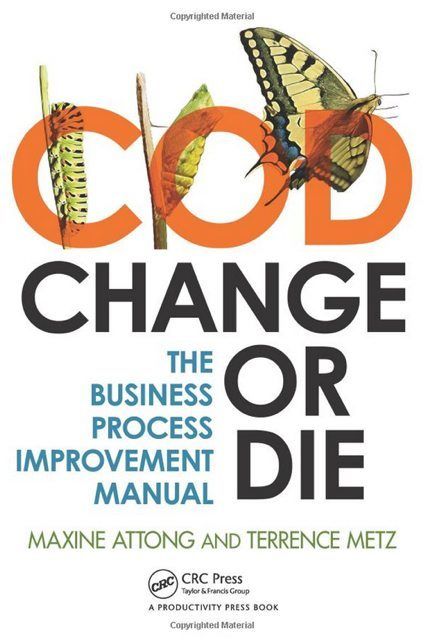Change or die? Most people do not change their minds—rather, they make a new decision based on new information. Sometimes the things they look at change as well.
Every morning a gazelle wakes up. It knows it must run faster than the fastest lion or it will be killed.
Every morning a lion wakes up. It knows it must outrun the slowest gazelle or it will starve to death.
It doesn’t matter whether you are a lion or a gazelle when the sun comes up . . .
. . . you’d better be running.
Source: Unknown
Change or Die – Darwin
Change is stimulated by decisions. Groups make higher quality decisions than the smartest person in the group because groups create more options. Any group or individual presented with more options is known to make higher-quality decisions.
Most change is incremental or evolutionary rather than revolutionary. Yet, by harnessing one degree Fahrenheit, steam power ushered in the industrial revolution. Today’s revolution is both digital and dynamic, it is “in-formation”. With anything in formation, change is inevitable, only growth is optional.
“It is NOT the strongest of the species that survives, nor the most intelligent, but the one most responsive to change.” — Charles Darwin
Change or Die – The Tao
Some of the best books about facilitating change do not mention the term or role of a “facilitator”. Take Dr Wayne Dyer‘s book for example, “Change Your Thoughts, Change Your Life.”
We have always argued that effective facilitation begins with clear thinking, and that unclear speaking or imprecise writing is indicative of unclear thinking. Dr. Dyer’s transliteration of “The Tao”, is also called “Living the Wisdom of the Tao.”
The 17th verse begins and completes as follows:
With the greatest leader above them,
people barely know one exists . . .
. . . The great leader speaks little,
He never speaks carelessly.
He works without self-interest
and leaves no trace.
When all is finished, the people say,
“We did it ourselves.”
Change or Die – Being Facilitative
One can easily substitute the term facilitator for a leader or include the adjective “facilitative” in front of the term, as in “facilitative leader.” Modern, facilitative leaders create an environment that is conducive to productivity, where all of the meeting participants feel that they have a personal responsibility to contribute and own the outputs, and the deliverables. Clear learnings that we can import from Dr. Dyer’s treatment of the 17th verse also include:
- Facilitators create an environment that helps everyone act responsibly.
- Effective facilitators are able to make themselves invisible when the group reaches high-performance mode. Although most groups do not reach this level, when they do, the facilitator becomes a scribe.
- When it is time for accolades, facilitators dissolve in the background, wanting the participants to feel that their accomplishments derive from their own talents.
- Instead of believing that they know what is best for a group, they trust the group participants and the method to generate what is best for them.
- The surest way to gain the trust and confidence of participants is to allow them to make as many decisions as possible. Avoid grabbing the low-hanging fruit by answering simple content. Put even the simplest items in the form of a question.
Try being more neutral as a business agent, friend, spouse, family member, parent, etc. and be surprised by the results of people who will live up to their own answers. Remember, there is usually more than one correct answer, the real question remains the taste for risk and reward.
______
Don’t ruin your career by hosting bad meetings. Sign up for a workshop or send this to someone who should. MGRUSH workshops focus on meeting design and practice. Each person practices tools, methods, and activities every day during the week. Therefore, while some call this immersion, we call it the road to building high-value facilitation skills.
Our workshops also provide a superb way to earn up to 40 SEUs from the Scrum Alliance, 40 CDUs from IIBA, 40 Continuous Learning Points (CLPs) based on Federal Acquisition Certification Continuous Professional Learning Requirements using Training and Education activities, 40 Professional Development Units (PDUs) from SAVE International, as well as 4.0 CEUs for other professions. (See workshop and Reference Manual descriptions for details.)
Want a free 10-minute break timer? Sign up for our once-monthly newsletter HERE and receive a timer along with four other of our favorite facilitation tools, free.

Terrence Metz, president of MG RUSH Facilitation Training, was just 22-years-old and working as a Sales Engineer at Honeywell when he recognized a widespread problem—most meetings were ineffective and poorly led, wasting both time and company resources. However, he also observed meetings that worked. What set them apart? A well-prepared leader who structured the session to ensure participants contributed meaningfully and achieved clear outcomes.
Throughout his career, Metz, who earned an MBA from Kellogg (Northwestern University) experienced and also trained in various facilitation techniques. In 2004, he purchased MG RUSH where he shifted his focus toward improving established meeting designs and building a curriculum that would teach others how to lead, facilitate, and structure meetings that drive results. His expertise in training world-class facilitators led to the 2020 publication of Meetings That Get Results: A Guide to Building Better Meetings, a comprehensive resource on effectively building consensus.
Grounded in the principle that “nobody is smarter than everybody,” the book details the why, what, and how of building consensus when making decisions, planning, and solving problems. Along with a Participant’s Guide and supplemental workshops, it supports learning from foundational awareness to professional certification.
Metz’s first book, Change or Die: A Business Process Improvement Manual, tackled the challenges of process optimization. His upcoming book, Catalyst: Facilitating Innovation, focuses on meetings and workshops that don’t simply end when time runs out but conclude with actionable next steps and clear assignments—ensuring progress beyond discussions and ideas.





Reblogged this on Gr8fullsoul.